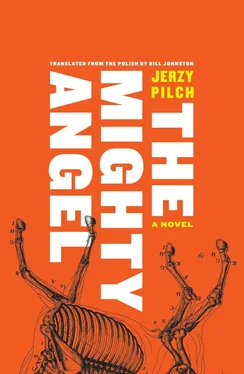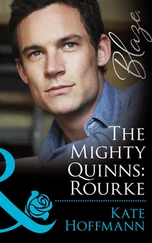Jerzy Pilch - The Mighty Angel
Здесь есть возможность читать онлайн «Jerzy Pilch - The Mighty Angel» весь текст электронной книги совершенно бесплатно (целиком полную версию без сокращений). В некоторых случаях можно слушать аудио, скачать через торрент в формате fb2 и присутствует краткое содержание. Год выпуска: 2009, Издательство: Open Letter, Жанр: Современная проза, на английском языке. Описание произведения, (предисловие) а так же отзывы посетителей доступны на портале библиотеки ЛибКат.
- Название:The Mighty Angel
- Автор:
- Издательство:Open Letter
- Жанр:
- Год:2009
- ISBN:нет данных
- Рейтинг книги:5 / 5. Голосов: 1
-
Избранное:Добавить в избранное
- Отзывы:
-
Ваша оценка:
- 100
- 1
- 2
- 3
- 4
- 5
The Mighty Angel: краткое содержание, описание и аннотация
Предлагаем к чтению аннотацию, описание, краткое содержание или предисловие (зависит от того, что написал сам автор книги «The Mighty Angel»). Если вы не нашли необходимую информацию о книге — напишите в комментариях, мы постараемся отыскать её.
A simultaneously tragic, comic, and touching novel,
displays Pilch’s caustic humor, ferocious intelligence, and unparalleled mastery of storytelling.
The Mighty Angel — читать онлайн бесплатно полную книгу (весь текст) целиком
Ниже представлен текст книги, разбитый по страницам. Система сохранения места последней прочитанной страницы, позволяет с удобством читать онлайн бесплатно книгу «The Mighty Angel», без необходимости каждый раз заново искать на чём Вы остановились. Поставьте закладку, и сможете в любой момент перейти на страницу, на которой закончили чтение.
Интервал:
Закладка:
Regardless of whether I’m talking sober or talking drunk, whether I say that from morning to night I’ve been drinking peach vodka, or that for a hundred and sixteen days not a single drop has passed my lips — regardless of what I say, in my talking I am elusive even to myself. Just as in my drinking I am elusive to myself and to the entire world.
How often is it, for example, that I’ve been striding down Szewska Street in Kraków sober as an angel, and I’ve not gone twenty yards, not twenty seconds have gone by, I’ve only gone sixteen yards and only sixteen seconds have passed, I enter the Market Square and in the blink of an eye, entering the Market Square, first of all, I myself render my angelhood human, then subsequently my humanity undergoes a rapid bestialization of its own accord, and in the blink of an eye, entering the Market Square, I’m as drunk as a beast. What has happened? Has the silver turret of my soul disintegrated into rubble? Has a black wind appeared to hurl me into the abyss and sit me on a high stool? What has happened? I don’t know. My not drinking on Szewska eludes me, and my drinking on the Market Square eludes me too.
I am the prince of elusiveness. When I say I do not drink, it is certainly the case that this is not true, but when I say I drink, I could equally be lying through my teeth. Don’t believe me, don’t believe me. A drunkard is ashamed to drink, but a drunkard has an even greater source of shame — he’s ashamed not to drink. What kind of drunkard doesn’t drink? The lousy kind. And what’s better: lousy or not lousy? What is superior: lousiness or not-lousiness? And besides — when one’s drunken destiny is about to be fulfilled, it’s not only futile but also indelicate, and even dishonorable, to try and get the better of that destiny.
When the Hero of Socialist Labor, a venerable foundry worker from the Sendzimir (formerly Lenin) Steel Mill, finally understood his own helplessness during one of his stays on the alco ward — when he understood that his drunken destiny had been fulfilled and had closed over him like a mound of earth over a mass grave — he was stupefied, and spent days on end standing outside the men’s bathroom, tears perpetually flowing down the gray stubble that covered his cheeks. He stood there outside the can like a monument to stupefaction and kept repeating:
“How can you not drink when everyone drinks? How can you not drink when everyone drinks? How can you not drink when everyone drinks? How can you not drink?”
And the poor fellow would have stood there till the Day of Judgment, he would have stood there till the day he was discharged from the alco ward, he would have stood there and wept, had Dr. Granada not called him into his office at a certain particularly desperate moment, sat him down in an armchair, and addressed him in more or less the following words:
“Soon you’ll be leaving here, Mr. Hero, and after you leave, if you manage not to drink, then don’t drink, with all your strength don’t drink, but announce to all and sundry that you’re drinking. That way you’ll avoid a great deal of stress that will push you to drink, you’ll avoid a great deal of pain, unpleasantness, indignation even. You’ll avoid glances filled with disappointment and expectations of the worst. You worked hard to earn your drunkard’s role, Mr. Hero, and right now it’ll be better both for you and your weakened health if you don’t unnecessarily complicate your own image. You entered our doors as a drunkard and for your own psychological well-being and the peace of mind of your closest friends you’ll leave here as the same drunkard, yet in reality you’ll merely be wearing the costume of a drunkard. You should not drink and you should assert openly, or give others to understand with plain hints, that you drink. Lie as long and as persistently as you’re able about drinking, especially since sooner or later you’ll start anyway.”
And the tears instantly dried on the gray stubble that covered the cheeks of the Hero of Socialist Labor, and a great weight was lifted from his heart, and he left Dr. Granada’s office with brightened visage, and after he left the office his visage shone more brightly still upon the rest of us.
Chapter 10. The River of Tranquility
I WAS NOT BOTHERED by Christopher Columbus the Explorer’s self-deception. I was not even bothered by his peremptory tone, that was tiresome in its dogmatism; I was inexpressibly bothered by the fact that certain of his arguments were irrefutable.
“There is no philosophy of drinking,” he would repeat, “there’s only the technique of drinking. There does, however, exist,” he would say, raising a finger in an unconsciously schoolmaster-like fashion, “there does, however, exist a philosophy of poor state of mind. In general, the meaning of human existence can be reduced to a never-ending struggle to improve one’s state of mind. This may for example involve ideology, religion, technological advances, or material goods; it may also involve drinking, or, to be precise, a competent application of the technique of drinking. In other words, life is a matter of adjusting one’s poor state of mind by means of the right technique of drinking. It can go wrong. When a person’s state of mind deteriorates to the point where no technique of drinking can help, or when the technique of drinking grows sloppy and instead of improving one’s state of mind it worsens it, then indeed problems can occur. I myself do not have such problems,” he would add emphatically, replacing his eyeglasses on his nose, reaching for his French translation of the New Testament, and seemingly beginning to read.
He was irritatingly, incontrovertibly, and terrifyingly right. When matters (I find it hard to use the casual term “technique of drinking” at this juncture), when matters, then, grow sloppy, the ever darker and ever deeper waters of the river on whose banks you are seeking solace will sooner or later start to yield up cadaverous limbs.
But for the moment the waters would be clear, they would flow like breathing; I had left the alco ward, behind me I had a twenty-minute cab ride and four stabilizing doubles, at my side I had an open bottle, the bright river of tranquility would be following its discreet course, I was in good shape, the technique of drinking invariably promotes a good state of mind, in any case there was no hysteria, no rapid movements, no drinking straight out of the bottle. I would drink methodically from a glass, in small, precisely measured, single-shot sips, and equally methodically I would be working. I would fill the bathtub with hot water, pour in an over-generous quantity of Omo-Color washing powder, and get ready to do my laundry. My washing machine had stopped working even before the fall of communism and the failure of both my marriages.
Chapter 11. Alberta Lulaj
I HOWLED. I DIDN’T hear my own howling, but I believe I actually howled — in any case they told me my howling was truly, truly horrible. They moved about the apartment; there weren’t many of them, but still I was in no condition to count them. I was in no condition to count to three. Where had they come from? Had they stepped out of the pages of literature? Had they emerged from The Trial or Humboldt’s Gift ? Had they come from the represented world of a novel in which there’s a scene involving a search or an arrest? I raised my leaden eyelids and, I confess frankly, I was afraid they were an alcoholic dream filled with references to the classics, I was afraid the season of amorphous literary specters was still in progress, but one of them leaned over me and straightened my pillow, I caught the leathery smell of his jacket and the spicy smell of his aftershave, and I was overcome by such a terrible wave of thirst that I would have been prepared to lick off all his aftershave to bring myself relief. Maybe I’d manage to gather a single drop mixed in with my saliva; a single drop never brings relief, but there’s always the moment of delusion while one is waiting for relief, and for the duration of that moment the dread is a little less. I smelled the smells and realized my alcoholic suspicions were unfounded, literature was decidedly out of the picture, someone was, without question, actually in my apartment. I turned my head — next to the mattress there ought to have been a bottle with a trusty something left, and even a couple of somethings. Once, I remember, in a comparable state I turned my head and I saw that the bottle was half full. Dear Lord, it was like a Mozart aria, it was like Leibnitz writing about the perfection of God. But not this time, this time there was nothing, there was not even an empty bottle at the head of my bed. I reached out a hand, or rather my tremulous hand began of its own accord to dart about in lizard-like fashion; it groped around in as broad an area as it could, but still there was nothing. The man who had straightened my pillow sat on the edge of the bed and pulled a bottle of Becherovka from under his arm. The sight alone of that legendary green glass, I must say, didn’t so much fortify me as cause my attention to be fortified, and now I could see quite clearly: two steps away there stood someone else, while on the other side of the room, in the armchair in the corner, sat a third person. Let me emphasize once again: these were not hallucinations (though after forty, or maybe a hundred and forty, days I had not only a right, but a duty to have hallucinations), these were not phantasms. Now too, as I am describing the whole situation, I want to avoid at all costs any kind of literary game, the sort of cheap trick of suggesting it’s unclear whether it really happened or the narrator merely imagined it. No. In my living room there actually were three people, though the third figure did in fact have something of the specter about them, dressed as it was in a curious outfit that I could not figure out, its head swathed in a hood.
Читать дальшеИнтервал:
Закладка:
Похожие книги на «The Mighty Angel»
Представляем Вашему вниманию похожие книги на «The Mighty Angel» списком для выбора. Мы отобрали схожую по названию и смыслу литературу в надежде предоставить читателям больше вариантов отыскать новые, интересные, ещё непрочитанные произведения.
Обсуждение, отзывы о книге «The Mighty Angel» и просто собственные мнения читателей. Оставьте ваши комментарии, напишите, что Вы думаете о произведении, его смысле или главных героях. Укажите что конкретно понравилось, а что нет, и почему Вы так считаете.












